by California Casualty | Homeowners Insurance Info |
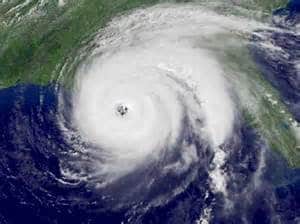 Hurricane season began June 1. Are you ready? The nation’s top emergency managers warn that millions of Americans from the Gulf Coast to the Eastern Seaboard as far north as Maine are in danger. Southern California has even experienced tropical storms, giving the West Coast a reason to be concerned.
Hurricane season began June 1. Are you ready? The nation’s top emergency managers warn that millions of Americans from the Gulf Coast to the Eastern Seaboard as far north as Maine are in danger. Southern California has even experienced tropical storms, giving the West Coast a reason to be concerned.
While hurricanes are associated with extreme winds, the National Hurricane Center warns that storm surge actually causes the most damage and loss of life. 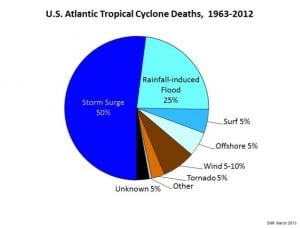 The Federal Emergency Management Agency (FEMA) has developed new maps to show the danger. They also have a list of hurricane preparedness tips that include:
The Federal Emergency Management Agency (FEMA) has developed new maps to show the danger. They also have a list of hurricane preparedness tips that include:
- Prepare an emergency kit
- Have a family evacuation and communications plan
- Install hurricane shutters or stock up on boards 5/8 exterior grade or marine plywood to cover windows and doors
- Install straps or additional clips to roofs to reduce damage
- Have a NOAA Weather Radio
- Be prepared to bring in anything that can be picked up by wind (bicycles, lawn furniture, play equipment, grills, etc.)
- Know how to turn off propane tanks and gas lines
- Keep your car’s gas tank full in case of evacuation
Are you covered if a hurricane strikes? The insurance industry recommends everyone take these steps:
- Learn how you can mitigate damage from wind and flooding associated with hurricanes
- Begin or update your home inventory (knowyourstuff.org)
- Understand your insurance – know whether you have actual cash value or replacement cost coverage, know how much living expenses coverage you have and make sure you have flood insurance (not covered with most home or renters insurance)
- Store copies of your inventory and insurance information in a safe location away from home
- Get an annual insurance review to make sure you have enough coverage for the dwelling and possessions
And here is what to do if there is damage to your property:
- Contact your insurance company as soon as possible
- Secure the property from further damage or theft
- Keep or document receipts and other expenses if you are evacuated or forced to find another place to live because of damage to your home or apartment
- Be wary of unscrupulous contractors following a natural disaster
California Casualty is ready to help before or after the storm. Contact an advisor today for a policy review, to arrange for flood insurance or upgrade coverages at 1.800.800.9410 or visit www.calcas.com. It’s also our policy to call customers in a disaster area to make sure you are okay and help start a claim, and our Claims department is available 24 hours a day, even on holidays if you have an emergency.
Resources for this article:
https://www.ready.gov/hurricanes
https://www.redcross.org/prepare/disaster/hurricane
https://www.fema.gov/national-flood-insurance-program-flood-hazard-mapping
https://www.nhc.noaa.gov/prepare/
https://viewer.zmags.com/publication/698e58a3#/698e58a3/1
This article is furnished by California Casualty, providing auto and home insurance to educators, law enforcement officers, firefighters and nurses. Get a quote at 1.800.800.9410 or www.calcas.com.
by California Casualty | Homeowners Insurance Info |
Springtime is tornado season in the United States. Many people have been lulled into false sense of security by the relatively slow start this year. But once again Mother Nature flexed her muscles sending destructive storms roaring through much of the Midwest. As the cleanup of twisted metal and splintered wood continues, it’s a reminder that people in tornado prone areas need to be ever vigilant of the often deadly storms.
Are you ready? A recent survey commissioned by the Property Casualty Insurers Association of America (PCI) found 56 percent of Midwesterners consider themselves not well prepared for the aftermath of a natural disaster or severe weather.
Tornados are violent, abrupt and are often obscured by rain or darkness. Being prepared ahead of time is essential.
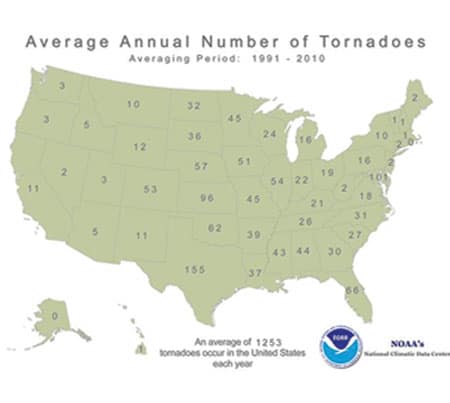
Here is important, potentially lifesaving information about tornados from Weather Underground:
- Develop an emergency plan for your family
- Know where safety shelters are located
- Monitor NOAA Weather Radio when severe weather is forecast
- Know the difference between a tornado watch and warning – a watch means conditions are right for tornado activity and people should be on alert, a warning means a tornado has been sighted and you should take shelter immediately
Here are tornado danger signs:
- Dark, greenish sky
- Large hail
- A large, dark, low-lying cloud that may be rotating
- A loud roar, often compared to a freight train
These are dos and don’ts from the American Red Cross if you are caught in a tornado:
- Do go immediately to an underground shelter, basement or safe room
- Do find a small windowless room in the interior of a home or hallway on the lowest level of a sturdy building
- Don’t stay in a mobile home unless absolutely necessary
- Do stay in your vehicle with the seat belt fastened and your head below the windows, covering your head with a blanket, coat or your hands
- Do go to a low lying area like a culvert or ditch if caught outdoors and cover your head with a coat or your hands
After a tornado:
- Continue listening to local news or a NOAA Weather Radio for updated information and instructions.
- If you are away from home, return only when authorities say it is safe to do so.
- Wear long pants, a long-sleeved shirt and sturdy shoes when examining your walls, doors, staircases and windows for damage.
- Watch out for fallen power lines or broken gas lines and report them to the utility company immediately.
- Stay out of damaged buildings.
- Use battery-powered flashlights when examining buildings – do NOT use candles.
- If you smell gas or hear a blowing or hissing noise, open a window and get everyone out of the building quickly and call the gas company or fire department.
- Take pictures of damage, both of the building and its contents, for insurance claims.
- Use the telephone only for emergency calls.
- Keep all of your animals under your direct control.
- Clean up spilled medications, bleaches, gasoline or other flammable liquids that could become a fire hazard.
- Check for injuries. If you are trained, provide first aid to persons in need until emergency responders arrive.
Some common myths associated with tornados are:
- Leave windows open to equalize pressure
- Tornados don’t hit large cities
- Tornados don’t occur in mountains
- Seeking shelter under an overpass is a safe
There is new information from recent storms that sturdy garage doors may be the best protector of a home. The study of tornado damage found wood frame homes with sturdy garage doors suffered less damage than homes with flimsy garage doors.
The research from the University of Alabama also concluded that tornado shelters – underground or above ground safe rooms – saved lives.
The researchers compared damage from major tornadoes that struck Moore, Oklahoma in 2013 to studies of similar storms that hit Tuscaloosa, Alabama and Joplin, Missouri in 2011.
Some of the conclusions:
- Flimsy garage doors proved to be a weak link, allowing pressurization that destroyed supporting walls and the roof when the garage was breached by devastating winds
- Storm shelters save lives even in the worst tornadoes
- In the areas damaged by lesser winds, the garage was often the root cause for failure of residential structures, allowing roofs and supporting walls to collapse
The study found that increased building safety standards and incorporation of more storm shelters are working to prevent some damage and save lives.
If your property suffers damage from a tornado:
- Secure the property from further damage or theft
- Contact your insurance company as soon as possible
- Inventory losses and take photos
- Save receipts of meals, purchases and hotels related to not being able to live in your home
- Be careful of unscrupulous contractors
This is also a reminder how important it is to take an inventory of your home and possessions before a disaster strikes.
Another way to protect your home is with an insurance policy review. Call a California Casualty advisor today, 1.800.800.9410 or visit www.calcas.com.
This article is furnished by California Casualty, providing auto and home insurance to educators, law enforcement officers, firefighters and nurses. Get a quote at 1.800.800.9410 or www.calcas.com.
Resources for this article:
https://www.nws.noaa.gov/om/severeweather/resources/ttl6-10.pdf
https://www.redcross.org/prepare/disaster/tornado
https://www.wunderground.com/resources/severe/tornado_safety.asp?MR=1
https://www.pciaa.net
https://esridev.caps.ua.edu/MooreTornado/Images/MooreTornadoFinalReport.pdf
by California Casualty | Homeowners Insurance Info |
California is parched, and bracing for another scary fire year. Once again, much needed rain and snow has eluded the state. The snow pack is a paltry six percent of normal and this January through March was the driest ever in recorded history. The U.S. Drought Monitor has much of the Golden State in extreme or exceptional drought.
In many areas the unprecedented drought has reduced the greenery to dried sticks and CAL FIRE is warning that moisture content in fuels like trees and grasses are at extremely low levels – leaving them tinder dry and susceptible to wildfire.
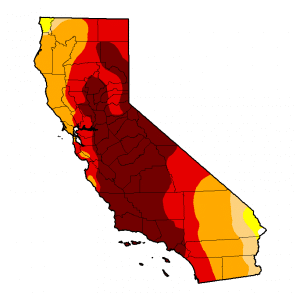
2015 Exceptional Drought-U.S. Drought Monitor
The National Interagency Fire Center is predicting above normal wildland fire potential for much of California, starting in May and June and continuing through fall.
It is imperative that you take steps NOW to protect your home and property.
That’s why California Casualty has prepared this important fire prevention information, because we have a stake in keeping you, your family and your most important asset as safe as possible.
Home Wildfire Prevention Tips:
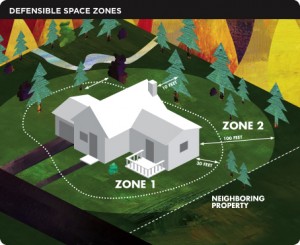
- Create a 30-foot defensible space around your home by removing as much flammable material as you can. Replace flammable vegetation with fire resistive plants.*
- Reduce the number of trees in heavily wooded areas by spacing native trees and shrubs at least 10 feet apart. On trees taller than 18 feet, prune lower branches six to ten feet off the ground.
- Remove branches overhanging the roof or coming within 10 feet of the chimney. Clean all dead leaves and needles from the roof, gutters, and yard.
- Install a roof that meets a fire classification of “Class B” or better. Cover the chimney outlet and stovepipe with nonflammable screening no larger than half-inch mesh.
- Install dual- or triple-paned windows, and limit the size and number of windows that face large areas of vegetation.
- Put woodpiles and liquid propane gas tanks at least 30 feet from all structures and clear away flammable vegetation within 10 feet of those woodpiles and propane tanks.
*California Casualty has a free “Reducing Wildfire Risk” pamphlet available here. You can also find additional helpful information linked from our home insurance page.
Help Firefighters Save Your Home!
- Make access easy. Roads need to be wide enough to accommodate fire trucks with room for them to turn around. Driveways and bridges must be strong enough to carry heavy emergency vehicles and equipment. Identify at least two ways to and from your house and make sure they are clearly marked. All access routes should be free of low hanging tree branches and cleared of flammable vegetation at least 10 feet from roads and five feet from driveways.
- Maintain an emergency water supply that meets fire department standards, such as a community water hydrant system, or a cooperative emergency storage tank with neighbors. If your water comes from a well, consider an emergency generator to operate the pump during a power failure. Clearly mark all water sources and create easy access to your closest emergency water source.
If You’re Forced to Evacuate:
- Know the best routes to safe areas and practice them with your family.
- Prepare an evacuation kit ahead of time.
- Know where and how you and your family will reconnect if you become separated.
In case of possible evacuation, your kit should contain the following items:
- Social Security cards
- Driver’s licenses
- Credit cards
- House deed
- Copies of vehicle titles
- Marriage license
- Birth certificates
- Copies of insurance policies
- Home inventory list / photos
- Health insurance cards
- Prescription medications
- Baby food or formula (if you have little ones)
- Important personal computer information downloaded to disk
- Valuable jewelry
- Photographs
- Home videos
- Items with sentimental value, such as wedding dress or baby keepsakes
- One week’s worth of clothing
- Pets with ID tags, carriers, and pet food
FEMA has more information about evacuation kit and plans at https://www.ready.gov/build-a-kit
Insurance Tips if You’re Impacted:
- Residents evacuated from their homes should contact their insurance agents or companies immediately and let them know where they can be reached. As adjusters are allowed into the burned-out areas they will want to go in with their policyholders to assess the damage. Many companies will set up 24-hour emergency hotlines.
- Keep receipts. Out of pocket expenses during a mandatory evacuation are reimbursable under most standard homeowner policies.
- Be prepared to give your agent or insurance representative a description of your damage.
- Take photos of the damaged areas. These will help with your claims process and will assist the adjuster in the investigation.
- Prepare a detailed inventory of all damaged or destroyed personal property. Be sure to make two copies-one for yourself and one for the adjuster. Your list should be as complete as possible, including a description of the items, dates of purchase or approximate age, cost at time of purchase and estimated replacement cost.
- Make whatever temporary repairs you can. Cover broken windows, damaged roofs and walls to prevent further destruction. Save receipts for supplies and materials you purchase. Your company will reimburse you for reasonable expenses in making temporary repairs.
- Secure a detailed estimate for permanent repairs to your home from a reliable contractor and give it to the adjuster. The estimate should contain the proposed repairs, repair costs and replacement prices.
- Serious losses will be given priority. If your home has been destroyed or seriously damaged, your agent will do everything possible to assure that you are given priority.
Don’t forget to make a complete inventory of all the items in your home before disaster strikes – doing so will help if you have to make a claim.
Here’s a List of Fire Prevention Resources:
www.calfire.ca.gov/fire-prevention
www.nfpa.org
www.disastersafety.org
https://www.redcross.org/images/MEDIA_CustomProductCatalog/m4340149_Wildfire.pdf
https://www.ready.gov/build-a-kit
https://www.knowyourstuff.org/iii/login.html
A defensible space pamphlet from California Casualty can be found on our resource page, www.calcas.com/resources.
by California Casualty | Homeowners Insurance Info |

You and your home have ridden out one of the coldest nights of the year; the weather is warming when suddenly you hear water running inside a room. It’s a burst pipe, which can lead to substantial damage in your home.
How much damage can a broken pipe cause? The Federal Emergency Management Agency estimates that just two inches of water can cause more than $10,000 for repairs and replacement of flooded items. Six inches of water can add up to more than $30,000.
While frozen pipes are most common in northern and mountainous areas of the country, they can occur anywhere when a major polar front hits. Homes from California to Florida have suffered water damage from broken pipes after spells of severe cold.
So before the thermometer plunges, here are things the American Red Cross advises you do to prevent pipes from freezing:
- Disconnect outside hoses from faucets
- Insulate water pipes, especially along exterior walls and unheated areas
- Add insulation to walls and attics where pipes may run
Once the sub-zero weather hits you should:
- Let faucets drip to prevent freezing
- Keep the thermostat above 55 degrees
- Make sure garage doors are closed
- Open kitchen and bathroom cabinets to allow warm air to circulate around plumbing
So you’ve prepared and kept as much heat as possible going to cold areas, but the cold air still froze a pipe; what now? Stay calm but act as quickly as possible to:
- Locate where the pipe is frozen
- Open the nearest faucet to relieve pressure when the ice thaws
- Slowly warm the pipe with a heating pad, hair dryer, space heater or wrapping it with hot towels – never use a blow torch or open flame
If the pipe has cracked or broken, immediately turn off water at the main water valve and call a plumber. Shutting off the water will prevent further damage.
Once a pipe freezes, odds are it will happen again. Here are some tips to prevent it in the future:
- Hire a plumber to relocate to a warmer area
- Add more insulation in walls, attics and crawl spaces
- Wrap the pipe with electric heat tape, when temperatures drop, plug it in
Remember, if a burst pipe sends water into your home, contact a California Casualty Claims advisor as soon as possible; we can help get you started on the clean-up.
And before the next cold front hits, call a California Casualty advisor for a free auto or home insurance policy comparison and review to make sure you are protected against winter’s fury, 1.800.800.9410.
Sources for this article:
https://home.costhelper.com/water-leak.html
https://www.floodsmart.gov/floodsmart/pages/flooding_flood_risks/the_cost_of_flooding.jsp
https://www.redcross.org/prepare/disaster/winter-storm/preventing-thawing-frozen-pipes
This article is furnished by California Casualty, providing auto and home insurance to teachers, law enforcement officers, firefighters and nurses. Get a quote at 1.800.800.9410 or www.calcas.com.
by California Casualty | Homeowners Insurance Info |

As the temperatures cool and the leaves begin to fall, don’t think your yard work is done. Autumn is a critical time for lawns, gardens and other landscaping. What you do now will impact how nice your lawn and garden look next spring.
Did you know that fall is when Kentucky Blue Grass starts regenerating and most root growth takes place? A good feeding and watering will do wonders for that lush green carpet you dream of in the spring and summer. It is also the best time to do weed control. So what do you need to do? These tips come from Lawn Care Made Easy:
- Increase the height of your mower blade; longer grass will help protect against winter’s cold
- Reseed bare patches
- Fertilize your lawn for a healthier spring growth
- Make sure to rake or mulch leaves that can choke your lawn
- Do extra weed control
- Remove highly acidic pine needles that can interfere with lawn growth
Don’t forget your garden. Fall is the time to clean up old plants, add mulch and plant bulbs that will burst with colorful flowers in the fall. Treehugger.com has a list of things you can plant in your garden this fall:
- Trees and shrubs
- Spring flowering bulbs (tulips, crocuses and daffodils)
- Perennials
Other important things you should be doing before the first freeze come from the article, 14 Fall Tips for a Better Spring Garden:
- Emptying hoses, rain barrels and sprinkler systems
- Prepare your spring garden beds and get cold frames and poly-tunnels ready for those early spring plants
- Winterize any garden ponds
- Give young trees and shrubs a good deep fall watering
- Clean, repair and sharpen tools and find proper storage for them
- Review and plan for next year
Just like your garden, when was the last time you had an auto or home insurance policy review? Have you upgraded your home, bought new appliances, electronics, jewelry or vehicles? Now is a great time to contact a California Casualty advisor to make sure you are getting the best coverage at the best value at 1.800.800.9410 or www.calcas.com.
Sources for this article:
https://www.lawncare-made-easy.com/fall-lawn-care.html
https://www.treehugger.com/lawn-garden/3-things-you-can-plant-your-garden-fall.html
https://www.ebay.com/gds/14-Fall-Tips-For-A-Better-Spring-Garden-/10000000178803946/g.html?roken2=ti.pTWVsaXNzYSBXaWxs
by California Casualty | Homeowners Insurance Info |
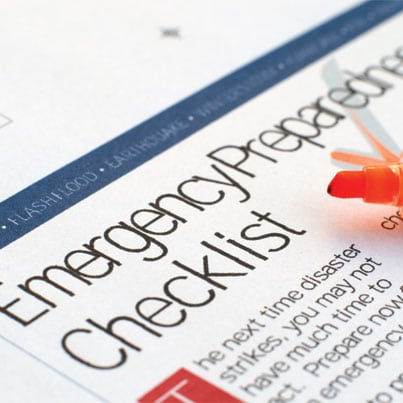
Ask anyone who has experienced a large earthquake; the experience is not fun. Walls shake, the earth rolls, and you have no control over what might happen for the next few seconds – or up to a minute – as the roller coaster continues. Californians are more aware after the recent temblor in Napa.
Now, there is more concern as the U.S. Geological Survey has expanded their maps of earthquake prone areas. The new mapping shows 42 states now facing a reasonable chance of a damaging quake within 50 years, with 16 sates facing a high risk of damaging ground movement. Those high risk states are Alaska, Arkansas, California, Hawaii, Idaho, Illinois, Kentucky, Missouri, Montana, Nevada, Oregon, South Carolina, Tennessee Utah, Washington and Wyoming.
Before a major shake “rocks your world,” Ready.gov has a comprehensive list of earthquake preparedness tips:
- Prepare an emergency kit, have an evacuation plan and determine how your family will communicate
- Fasten shelves securely to walls
- Make sure large or heavy items are on lower shelves and breakable items like bottles, glass and china are stored in low, closed cabinets with latches
- Repair defective electrical wiring or leaky gas connections and install flexible pipe fittings to avoid gas or water leaks
- Locate safe spots in each room under a sturdy table or against an inside wall
- Hold earthquake drills with your entire family
Safety is paramount after the shaking has subsided. The American Red Cross has a checklist of does and don’ts following an earthquake that include:
- Turn off water and gas main-lines to your dwelling
- Stay away from downed power lines and damaged structures
- Extinguish small fires
- Clean up spilled medications, bleach or other dangerous liquids
- Monitor updates with battery powered or hand-crank radios
- Offer help to those who might be trapped or need special assistance.
Once you are in a safe place, contact your insurance company. Keep in mind that earthquake damage is not a part of most people’s home insurance policy; separate earthquake coverage needs to be purchased. Earthquake insurance is available as an endorsement to California Casualty homeowners in California, Oregon, Missouri, Illinois, Kentucky and Rhode Island and California Casualty has partnered with GeoVera to underwrite earthquake insurance for homeowners in California, Oregon and Washington. If you need earthquake protection, call a California Casualty advisor today at 1.800.800.9410.
Sources for this article:
https://www.ready.gov/earthquakes
https://pubs.usgs.gov/of/2014/1091/
https://earthquake.usgs.gov/hazards/
https://www.redcross.org/prepare/disaster/earthquake
 Hurricane season began June 1. Are you ready? The nation’s top emergency managers warn that millions of Americans from the Gulf Coast to the Eastern Seaboard as far north as Maine are in danger. Southern California has even experienced tropical storms, giving the West Coast a reason to be concerned.
Hurricane season began June 1. Are you ready? The nation’s top emergency managers warn that millions of Americans from the Gulf Coast to the Eastern Seaboard as far north as Maine are in danger. Southern California has even experienced tropical storms, giving the West Coast a reason to be concerned. The Federal Emergency Management Agency (FEMA) has developed new maps to show the danger. They also have a list of hurricane preparedness tips that include:
The Federal Emergency Management Agency (FEMA) has developed new maps to show the danger. They also have a list of hurricane preparedness tips that include:





